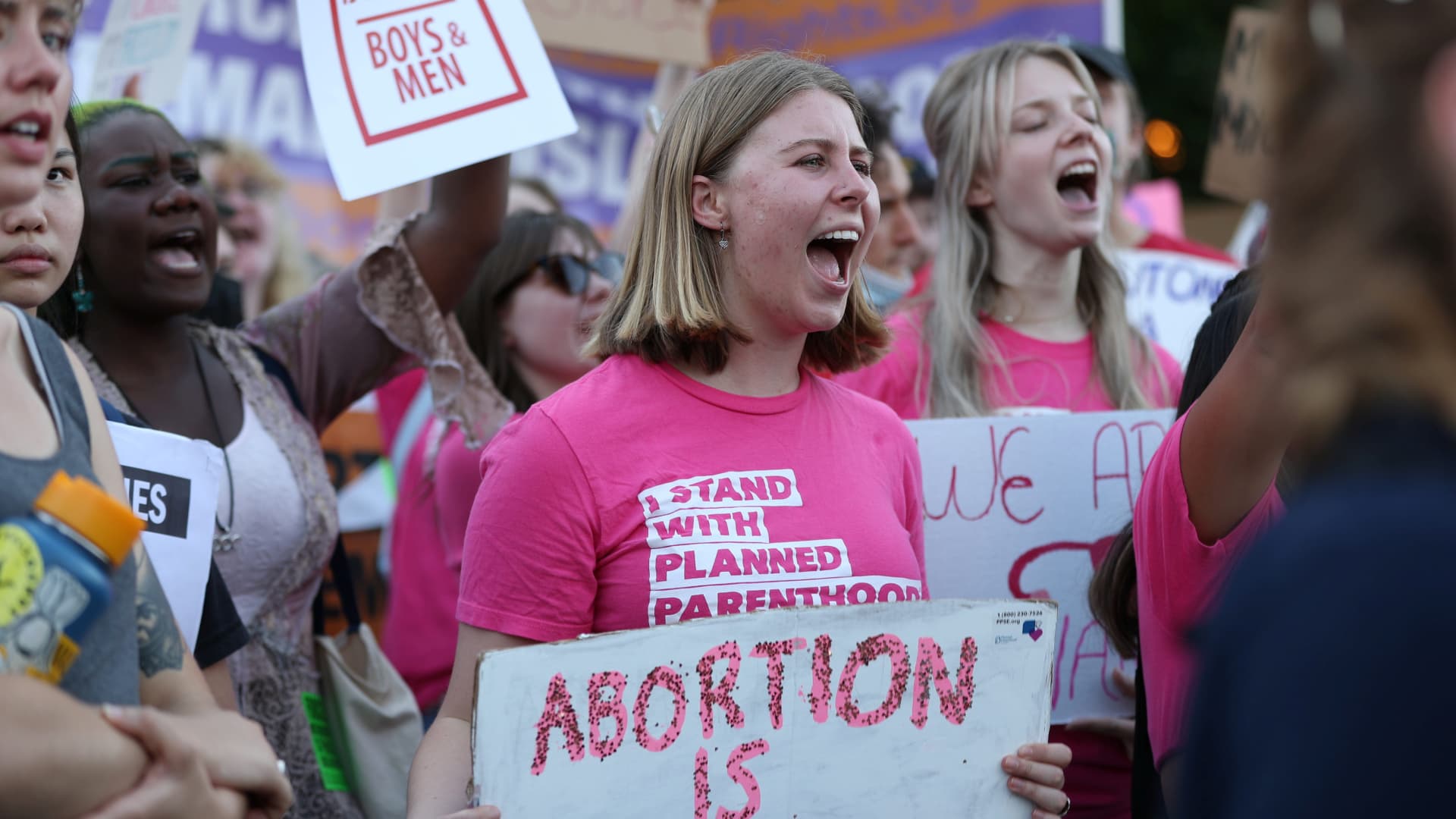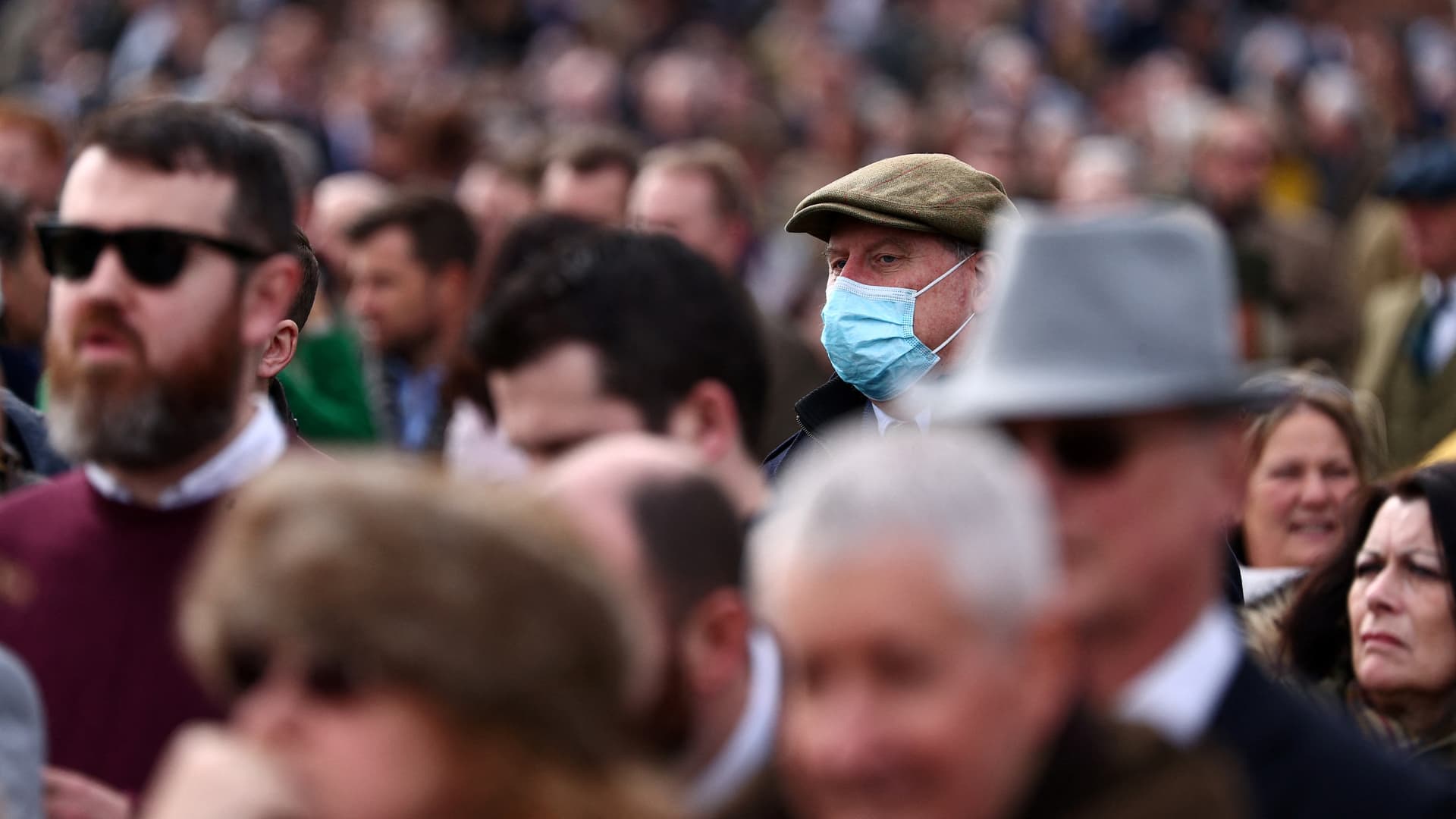Judge suggests abortion might be protected by 13th Amendment despite Supreme Court ruling
The Supreme Court, with a majority opinion by Justice Samuel Alito, ruled there was no federal right to abortion, overturning its Roe v. Wade decision.

Agnes Scott College student Jordan Simi (C) participates in a chant during a pro-abortion rights march and rally held in reaction to the leak of a draft U.S. Supreme Court majority opinion written by Justice Samuel Alito preparing for a majority of the court to overturn the landmark Roe v. Wade abortion rights decision later this year, in Atlanta, Georgia, May 3, 2022.
Alyssa Pointer | Reuters
A federal judge suggested Monday that the federal right to abortion — which the Supreme Court overturned last year — might still be protected by the Constitution's 13th Amendment, which abolished slavery.
Judge Colleen Kollar-Kotelly posed that eyebrow-raising hypothetical in a court order in a criminal case against a group of anti-abortion activists charged with blocking access to an abortion clinic in Washington, D.C.
Kollar-Kotelly's order told prosecutors and defense lawyers to file briefs by next month on the questions of whether the Supreme Court's ruling only addresses the issue of whether abortion is not protected by the 14th Amendment, and if any other provision in the Constitution "could confer a right to abortion."
Her order in Washington District Court could end up being an invitation to federal legal challenges on 13th Amendment grounds to state laws that sharply restricted access to abortion in some states after the high court's controversial decision overturning its 1973 ruling in Roe v. Wade. The order was previously reported by Politico.
U.S. District Judge Colleen Kollar-Kotelly
Charles Dharapak | AP
The 14th Amendment covers several rights, including citizenship rights and a prohibition against the government depriving "any person of life, liberty, or property, without due process of law."
That amendment's due process clause was a keystone of the Supreme Court's prior ruling in Roe v. Wade which first established the federal right to abortion.
But Kollar-Kotelly in her order wrote that the 13th Amendment "has received substantial attention among scholars and, briefly, in one federal Court of Appeals decision" on the question of whether that section of the constitution could apply to abortion.
A 1990 paper by a Northwestern University School of Law professor found that the 13th Amendment, with its prohibition against involuntary servitude, provides a textual basis for the right to abortion.
"When women are compelled to carry and bear children, they are subjected to 'involuntary servitude' in violation" of that amendment," wrote the paper's author Andrew Koppelman, which was cited by Kollar-Kotelly in her order.
In a 1995 ruling on a question of legal fees in a case that challenged Utah's abortion law, a panel of judges on the U.S. Court of Appeals for the 10th Circuit said a district court judge was wrong to assign fees on the grounds that the arguments against the law, which cited the 13th Amendment, were frivolous.
"Without expressing a view on the merits of the involuntary servitude argument, we hold that it is not frivolous," the appeals panel wrote.
CNBC Politics
Read more of CNBC's politics coverage:
Watch live: U.S. House Speaker Kevin McCarthy speaks on the debt ceilingFailing to raise U.S. debt ceiling would lead to 'economic and financial catastrophe,' Yellen saysGeorge Santos denies sexual harassment accusation from ex-prospective stafferNeo-Nazi and woman charged with conspiring to attack Maryland power gridBiden delivers State of the Union address amid high inflation, divided Congress that threaten to derail economyChinese spy balloon fallout roils Washington and BeijingTrump appeals nearly $1 million in sanctions for 'frivolous' suit he filed against Hillary ClintonCriminals use Telegram to recruit 'walkers' as America's big banks see an 84% increase in check fraudNew York office of Rep. George Santos vandalized with graffiti, police sayDecades-low unemployment rate is welcome news for Biden ahead of State of the UnionChina's suspected spy balloon prompts Blinken to postpone Beijing trip as Congress seeks answersDebt ceiling deal no closer as McCarthy, Biden vow to continue talksSuspected Chinese spy balloon found over northern U.S.Republicans vote to remove Rep. Ilhan Omar from the Foreign Affairs CommitteeSen. Kyrsten Sinema pulls in cash from Wall Street, real estate titans as she mulls reelection bidNancy Pelosi endorses Adam Schiff in California Senate race if Sen. Dianne Feinstein doesn't runBiden-McCarthy meeting yields no debt ceiling deal, but speaker says markets should be encouragedRussia has committed more than 65,000 war crimes in Ukraine, prosecutor general says2024 GOP presidential primary starts to take shape as Trump’s potential rivals Haley, Scott, Pence make movesThe judge's order came in a case where Lauren Handy, a Virginia resident, and nine other anti-abortion activists were charged in an indictment last year with conspiring to obstruct access to a Washington abortion clinic on Oct. 22, 2020.
Handy and the other defendants have asked Kollar-Kotelly, who was appointed to the district court in Washington by former President Bill Clinton, to dismiss the indictment for lack of jurisdiction.
Their argument is at least partially based on the grounds that the court's majority opinion by Justice Samuel Alito last year, in the case known as Dobbs v. Jackson Women's Health Organization, said "the Constitution does not confer a right to abortion," the judge noted in her order.
But Kollar-Kotelly wrote that argument "is predicated on the false legal premises that the "federal law cited in the indictment "only regulates access to abortion," when in fact is also regulates access to a broad category of reproductive health services.
"Nevertheless, to the extent that Defendants seek resolution of this matter via a constitutional holding, the Court will require additional briefing," Kollar-Kotelly wrote.
The judge wrote that the question before the high court in Dobbs "was not whether any provision of the Constitution provided a right to abortion."
"Rather, the question before the Court in Dobbs was whether the Fourteenth Amendment to the Constitution provided such a right," Kollar-Kotelly wrote.
"That is why neither the majority nor the dissent in Dobbs analyzed anything but the Fourteenth Amendment," she wrote. "In fact, on the Court's initial review, not a single [friend-of-the-court] brief mentioned anything but the Fourteenth Amendment and the unratified Equal Rights Amendment."
The 14th Amendment's due process clause was cited by the Supreme Court in Roe v. Wade, which established that there was a right to privacy contained in that clause and elsewhere in the Constitution which gave people the right to obtain an abortion until a fetus became viable.
In its ruling tossing out Roe, the Supreme Court wrote in its majority opinion that the 14th Amendment "clearly does not protect the right to an abortion."
Kollar-Kotelly wrote that "it is entirely possible that the Court might have held in Dobbs that some other provision of the Constitution provided a right to access reproductive services had that issue been raised."
"However, it was not raised," she noted.
And she wrote that since last year, the court's holding that the Constitution does not confer a right to abortion "is often read as saying 'the Supreme Court held that no provision of the Constitution extends any right to reproductive health services.' "
Kollar-Ketelly wrote that for her part, she "is uncertain that this is the case."

 Astrong
Astrong 





























.jpg&h=630&w=1200&q=100&v=f776164e2b&c=1)


